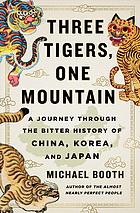
Three Tigers, One Mountain
A Journey Through the Bitter History and Current Conflicts of China, Korea, and Japan
کتاب های مرتبط
- اطلاعات
- نقد و بررسی
- دیدگاه کاربران
نقد و بررسی

February 1, 2020
A British journalist's tenacious, on-the-ground reporting of the continued "sibling rivalry" among the three major East Asian economies, who "ought to be the firmest of allies." Booth, long fascinated by the region, intriguingly compares the long-simmering resentment among China, Korea, and Japan to an ongoing family feud. Looking at the arrival of Matthew Galbraith Perry's ships in Tokyo in 1853, the author writes, "China had been the Middle Kingdom, font of all knowledge, technology, and civilization; Korea was the primary tributary land, the middle sibling, and Japan the vaguely barbaric little brother, but the trauma of the [ships'] arrival lit the fuse for a quasi-revolution in Japan," which ultimately led "to a catastrophic attempt to build an empire based on the Western model." Via a systematic journey through these countries (first Japan, then China, then Korea), the author, employing a jocular, tongue-in-cheek, nondidactic tone, underscores how the bad blood--both popular feeling and political leaning--customarily emanates from Japan's strong-arm tactics and perceived lack of reckoning toward the other two brothers. As Booth points out, the hundreds of thousands of Koreans living in Japan after World War II, descendants of Japan's shameful annexation of Korea between 1910 and 1945, "faced heavy discrimination in the postwar employment market," and they still endure stiff biases regarding citizenship and identity. In addition to land disputes, the unresolved wounds of the Chinese and Korean "comfort women"--enslaved by the Japanese military during WWII--continue to rankle relations. Chronicling his visits to museums and shrines in all three countries, the author gives an excellent sense of how each views itself in relation to the others--through what they teach (or fail to teach) to their own people. Booth's simple yet ingenious thesis encapsulates so much of what is still going wrong there, with an ancient rivalry not likely to be resolved soon. An evenhanded, accessible, and pertinent work of Asian history and current affairs.
COPYRIGHT(2020) Kirkus Reviews, ALL RIGHTS RESERVED.

February 14, 2020
East Asia can be a tense region, and not only because of current concerns about North Korean missiles and disagreements over Taiwan's status. Lingering Chinese and South Korean memories of Japanese invasion and colonization also challenge modern diplomatic relations. Journalist Booth (The Meaning of Rice: A Culinary Tour of Japan) travels to various cities in Japan, Korea, China, and Taiwan. He interviews a variety of people, including academics, activists, and politicians, to provide a better understanding of the animosity that exists among the countries of this region. The people and places visited highlight the intersection of these cultures and their complex histories: minority Koreans living in Japan; Nanjing, China, the site of the massacre carried out by Japanese soldiers in 1937-38; an elderly Taiwanese man who served in the Japanese military in World War II. The result is an excellent synthesis of the current relationships in the region that includes a wide variety of voices and perspectives. VERDICT An enjoyable read that provides a useful introduction to the cultures, histories, and current events of three major countries in East Asia. Highly recommended for general readers with an interest in the region.--Joshua Wallace, Tarleton State Univ. Lib. Stephenville, TX
Copyright 2020 Library Journal, LLC Used with permission.

March 9, 2020
Journalist Booth (Super Sushi Ramen Express) explores East Asian power dynamics in this entertaining yet glib account. While the region’s three strongest democracies (South Korea, Taiwan, and Japan) “ought to be the firmest of allies” aligned against China’s superpower aspirations, according to Booth, wars, colonialism, and deep-seated ethnic distrust add up to a “noxious pan-regional family feud” that shows no sign of abating. He explains how the 1937 Rape of Nanjing, visits by conservative Japanese politicians to a Tokyo shrine that includes war criminals, and Korea’s postcolonial agonies contribute to regional discord; describes the opening of Japan to the West by 19th-century U.S. naval captain Commodore Perry; and touches on lighter subjects such as Taiwan’s profound influence on fashion, design, and food trends in mainland China. Though Booth does a credible job getting expert opinions—often from British expatriates who’ve taught in the region for decades—his mix of witty travelogue and adept historical recaps doesn’t allow any single facet to be explored in great detail. Cheerfully digressive and intellectually undisciplined, this enthusiastic account will whet readers’ appetites for a more in-depth treatment of the political, cultural, and historical forces at play in the region.

























دیدگاه کاربران